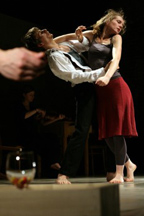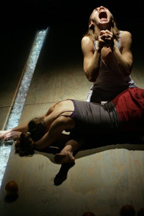

performance
The Theatre ZAR Association, Wroclaw, Poland
Project Leader, Lights Designer: Jarosław Fret
Performers/Musicians: Ditte Berkeley, Kamila Klamut, Matej Matejka, Nini Julia Bang, Ewa Pasikowska, Aleksandra Kotecka, Tomasz Bojarski
‘Off’ Singers: Tomasz Wierzbowski, Jean François Favreau
Technicians: Przemysław Błaszczak, Maciej Mądry
Company Manager: Magdalena Mądra
Music collaboration: Mariana Sadowska
Collaboration on the movement score: Vivien Wood
The show lasts 50 minutes.
There is but one truly serious philosophical problem, and that is suicide. Judging whether life is or is not worth living amounts to answering the fundamental question of philosophy. All the rest whether or not the world has three dimensions, whether the mind has nine or twelve categories comes afterwards. These are games; one must first answer. Albert Camus, The Myth of Sisyphus
Caesarean Section. Essays on Suicide
Caesarean Section – the research that falls under this name is an attempt to tackle the theme of suicide. The title of the performance is essentially a metaphor for the compulsion towards and the condition of suicide, and the involuntary force that pulls one back from the brink. It is about the potential and necessary ability to prolong one’s breathing at the moment when one feels the pieces of glass, within the veins, that haven’t yet managed to reach the heart. It is an exploration of the liminal space between two impulses.
Caesarian Section is the second performance from Theatre ZAR, which further develops the group’s work with polyphony and its aim to create theatre from the spirit of music. The musical structure of this performance was developed from a base of polyphonic Corsican songs, into which Bulgarian, Romanian, Icelandic and Chechen songs have been woven. Through its contact with and integration into this contemporary theatre piece, the traditional musical material has been transformed and has taken on a new form, becoming seamlessly interwoven with an intensive movement score. The subtle power and energy of the piece owes a debt to Erik Satie and his identification of the intensity that can be transmitted in each and every drop of sound. In its literary aspect, the project refers to the work of Aglaјa Veteranyi .
--
The ensemble of the Theatre ZAR Association was initially formed through almost three years of expeditions and rehearsals concerning the project Gospels of Childhood. Members were gathered for the project from training sessions at the Grotowski Centre and their work was directed towards the long-term development of actors’ skills, as well as towards discovering new forms of expression, based mainly on acting through song. Therefore, the character of the project proved to be musicological, but was not so much dedicated to conventional ethno-musicological research as to an attempt to recompose and reshape the musical material acquired during the expeditions.
Aglaja Veteranyi (1962 Bucharest – 2002 Zurich), the remarkable figure of Swiss literature and literature in German learned this language only as she was becoming an adolescent. This actress, artist, world traveller, literary and theatrical experimentalist grew up in a family of Romanian-Hungarian-Roma origin, her mother tongue being Romanian. She published her works in literary periodicals for years; only one of her novels Warum das Kind in der Polenta kocht – which gradually became more and more interesting to the reading audience and critics – was published independently during her life. Two more of her books have been published after her death. Aglaja Veteranyi committed suicide by drowning in Lake Zurich.
